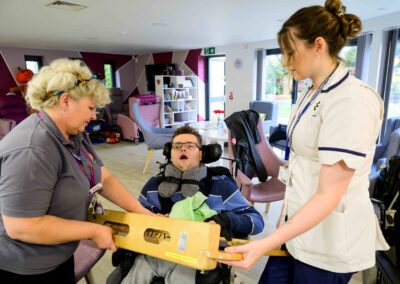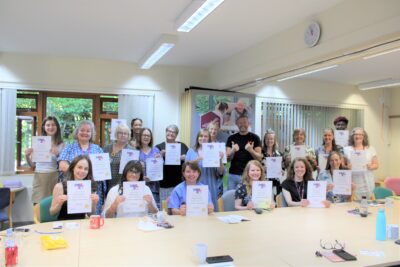From patients to volunteers for the hospice
The theme of Hospice Care week this year is ‘Connecting Care,’ looking at just how many services are on offer at St Elizabeth Hospice and how those who use them become integral members of the hospice community.
Patients, volunteers, visitors and staff all mingle together at Suffolk-based St Elizabeth Hospice, where there is laughter, smiles and above all – care – all of which goes both ways.
Volunteers become members of staff; families make friends; visitors take on fundraising challenges and patients become volunteers.
One such patient is Linda Moore, 67, who was diagnosed with COPD, angina and polymyalgia 4 years’ ago and began to use St Elizabeth Hospice day services. She attended originally once a week and freely admits that it was those days which kept her going.
“It was good to meet other people and have a chance to get out of my flat. It was those regular visits to day care which really kept me going at that time.”
Linda became a regular patient on Tuesdays and started to take full advantage of the services on offer, trying reiki, hand massages, physiotherapy, music and art therapies, as well as making contact with the spiritual care team and having her hair done regularly by one of the volunteer hairdressers.
Linda is certain that these treatments had a huge, positive impact on her emotional and physical health: “The complementary therapies, especially reiki, made me feel so much better internally which, in turn, made a physical difference too.”
Be involved
It wasn’t long before Linda was approached by hospice staff running the Larch Group, a ground-breaking schools project designed to tackle taboos around death, to ask if she would like to be involved. Linda willingly accepted the invitation and, along with another patient, Gordon, met up with two boys from St Mary’s primary school, Ipswich.
The project invites schoolchildren to visit the hospice once a week for a month to take part in group activities with day care patients. Together, they explore issues such as death, hospice care, bereavement, disability and loss.
With the two boys, both aged 10, Linda and Gordon explored the subject of sport and holidays and how they have changed from when they were young to the present day.
Linda observes: “It was an interesting project through which we discovered that the passions of players and supporters remain the same, much like children’s expectations of holidays, despite the destinations becoming more exotic.”
Whilst working with the patients, the pupils are able to ask any questions about their illness and experiences, and taboo subjects are explored openly with the support of skilled hospice staff. The idea of the project is to provide a source of therapeutic group work for the patients through working together to express the stories they have heard in a creative way such as, song, art, scrapbooking or drama.
At the end of the four weeks the boys, with Linda and Gordon, were able to celebrate their journey at a presentation party attended by family members, school staff, hospice employees and volunteers.
Two years later, Linda participated again, this time with two other boys from Rendlesham primary school.
“The boys were all delightful; I couldn’t have met nicer children. They were polite, smiling and sent us lovely letters of thanks expressing how much they had enjoyed working with us. It was good to help them see what patients in a hospice are really like.”
Nothing is too much trouble
Four years on from her initial diagnosis and having coped with periods of hospitalisation in that time, Linda is now feeling better than she has in a long time.
“I really feel as if I have turned a corner since the springtime and have been feeling much better for these past three months, so much so that now is the time that I can try to give something back.”
Despite having been told that she now has osteoarthritis in her hands, Linda wants to do something for the place which has done so much for her.
She says: “Nothing is too much trouble for anybody at the hospice, no matter what their role is. For example, the senior physiotherapist, Andrea, made all the difference to how I live my life by helping me to get my new, easy access ground floor flat in Ipswich.”
From patient to receptionist
Linda is currently training to be a Sunday morning receptionist at St Elizabeth Hospice later on this month. A chance remark about manning the reception desk when she was attending an event at the hospice soon became a serious proposition.
Linda wants to help whilst she is feeling well and will do what she can for however long she feels able.
She said: “I can give back myself to show my gratitude for now feeling well.
“The hospice has been the key. People work so hard to make our lives better in so many ways, like laying on trips to Felixstowe, to walk along the pier and have fish and chips. I have been on two this year and had fabulous days out on both occasions.
“There is no problem with me being a patient and a volunteer receptionist but I have been told that I must not feel under pressure.
“Volunteer services stressed the point saying ‘we are here for you’.
St Elizabeth Hospice is fortunate to have a dedicated group of supporters within the local community. With more than 1,200 volunteers, the hospice has advocates from all walks of life helping to spread their message.
Dean Sutton – Patient to partnership group
One more of those advocates can be found in another patient-turned-partnership-group-member, Dean Sutton.
Dean has been attending day services since 2010 when he was referred by Ipswich hospital after suffering from a severe bout of life-threatening septicaemia. His wife, Judith, explains: “He was given about a 5% chance of survival as his kidneys had shut down and he was not able to be injected with any more morphine.
“St Elizabeth Hospice’s medical director, Kelvin Bengston was called in to help with pain relief. He was a life-saver.”
She continues: “The philosophy of the hospice being about quality of life made all the difference as Dr Kelvin was able to get him completely pain-free so he was then able to start on a slow recovery.”
Dean returned home three months later and, whilst he remained bed-ridden for a whole year, Dr Kelvin continued to visit him at home, as did the hospice at home and family support teams.
Dean recalls: “The hospice teaches you to set short-term goals and helps you to reach them.”
It was with this help and through sheer will and determination, that Dean finally made it onto his feet again in 2011.
He received regular visits at home from complementary therapists providing reiki massages and helping with his developing problems with agoraphobia. Between them, they managed to get Dean back into day care.
Again, at Doctor Kelvin’s initial request, Dean became a Partnership group member specifically representing non-cancer patients.
The Partnership Group is made up of hospice patients, carers of current or former patients and staff members and has been running for over ten years.
It was set up so that the views of patients and carers were represented and listened to so the hospice can continue to deliver the very highest standard of care and support and to help everyone accessing hospice services to feel comfortable, safe and valued as individuals.
Dean added: “The hospice has been incredibly supportive to me in recent years in many ways.
“Being a member of the Partnership Group allows me to represent the views of my fellow patients and help ensure that everyone receives the best care possible, like I did.”
Volunteers are the glue that hold the hospice together
St Elizabeth Hospice has hundreds of incredible volunteers who give up their time to support the hospice and patients and families in a variety of ways.
Between them they spare an amazing 2,000 hours every week and save the hospice an impressive £1.1million.
Tracy New, HR volunteer services business partner at the hospice, said: “We are extremely lucky to have so many wonderful volunteers supporting our staff and departments – they are vital to the running of the organisation and without them, we wouldn’t be able to open our doors.
“Their support and time is invaluable to us and every single one of them makes a difference to the lives of our patients and their families and carers.”
Anyone aged 16 and up can be a volunteer for the hospice and you don’t have to have a connection to the organisation. It’s a great way to build new skills, meet new people, boost your CV and contribute towards the quality of a patient’s care and be part of a fantastic community.
Volunteer roles include helping on reception, assisting in one of the hospice’s 25 shops, driving the van to collect donations of furniture, helping on the inpatient unit or in day care and many more.
You can also see all the hospice’s volunteer vacancies online by clicking here, or to find out more about volunteering, call 01473 707016 or email volunteer@stelizabethhospice.org.uk.



